

Facebook Engagement Dips: 34% Spend Less Time on Site [STUDY] Facebook Engagement is Actually Up, Despite Reuters Poll. Although a poll circulated the web last week that found one-third of Facebook users are using the social network less than six months ago, statistics show site engagement is actually up.
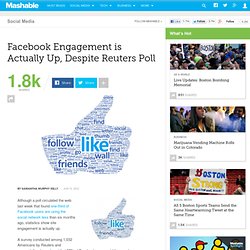
83 Million Facebook Accounts Are Fake. Facebook Marketers Reveal States Where Users Click on Ads Most [EXCLUSIVE] Facebook users in South Dakota, Tennessee and Colorado click through ads on Facebook at record rates.
![Facebook Marketers Reveal States Where Users Click on Ads Most [EXCLUSIVE]](http://cdn.pearltrees.com/s/pic/th/facebook-marketers-exclusive-26518883)
In South Dakota, Facebook users click on ads at a rate of 174% the national average. Meanwhile, residents of Vermont, Alabama and Indiana are the least likely to take the bait. In Vermont, the click-through rate (CTR) is 57% the national average. This is according to data provided exclusively to Mashable by marketing agency TBG Digital, which works with high-profile clients including jetBlue, Heineken and Coca Cola.
TBG analyzed more than 7.6 billion Facebook ad impressions from its client base during December, January and February. While the click-through data is powerful information for online marketers, TBG CEO Simon Mansell cautions that it's not the be-all end-all for advertisements. What people do after they click on ads, for example, is among a host of other factors that determine an ad's ultimate success. And where does Facebook earn the most money off the ads it hosts? Facebook Can Tell You If A Person Is Worth Hiring. 20 Infamous Crimes Committed and Solved on Facebook [INFOGRAPHIC]
Use Facebook While Studying, Get Lower Grades. Facebook Profiles Accurately Predict Job Performance [STUDY] Do you want to know how that applicant you just interviewed will actually perform on the job?
![Facebook Profiles Accurately Predict Job Performance [STUDY]](http://cdn.pearltrees.com/s/pic/th/accurately-performance-23663759)
Check out her Facebook profile. That's the advice of a new study from the Northern Illinois University, the University of Evansville and Auburn University. The researchers recruited a group of four Facebook-savvy human resources professionals and students to evaluate the Facebook profiles of 56 users. The four perused each of the profiles for about 10 minutes each before grading them according to the so-called Big Five personality traits (openness, conscientiousness, extraversion, agreeableness and neuroticism). Six months later, the researchers compared the evaluations of the 56 users' work supervisors and found a strong correlation for traits including intellectual curiosity, agreeability and conscientiousness. For instance, Don Kluemper, one of the authors of the study, says that contrary to popular belief, a picture of you partying won't necessarily hurt your chances of getting hired. [STUDY] Your Facebook Friends Influence How You Feel. "A cute baby dolphin for your weekend-viewing pleasure" a Facebook friend of mine writes.
![[STUDY] Your Facebook Friends Influence How You Feel](http://cdn.pearltrees.com/s/pic/th/facebook-influence-readwrite-82316388)
Under the text, I see a link to an imgur-hosted image of that amazingly adorable marine mammal. Suddenly, my day is feeling a lot better. Did I just catch a mood... on Facebook? A new study by Facebook data scientists shows that Facebook users can spread emotions to their friends through messages, posts and status updates. It suggests that emotional contagion happens quite frequently on the world's biggest social network.
"It's time to rethink how emotional contagion works, since vocal cues and mimicry aren't needed," said Kramer. To test this out, Kramer used a program that identified words implying positive and negative emotions in Facebook status updates. On Facebook and Twitter, Few Want Political News [STUDY] Only six percent of Americans are getting their political news from Facebook while a meager two percent do the same on Twitter, according to a study conducted by the Pew Research Center for the People & the Press.
![On Facebook and Twitter, Few Want Political News [STUDY]](http://cdn.pearltrees.com/s/pic/th/facebook-twitter-political-22935582)
The study, which analyzed how Americans are watching the 2012 presidential race, also found that interest is down from 2008 across mediums. 29 percent of respondents have said they're following news about the election "very closely," down from 34 percent the same time last year. The campaign has lost the interest of many young Americans. In 2008, 31 percent of people aged 18-29 said they were paying close attention to the political showdown. This time around, only 20 percent are dialed in. INFOGRAPHIC: How To Spot Fake Facebook Accounts. How can you tell if a Facebook account is fake?
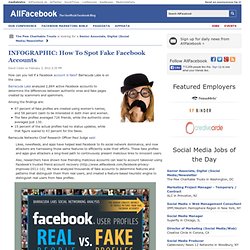
Barracuda Labs is on the case. Barracuda Labs analyzed 2,884 active Facebook accounts to determine the differences between authentic ones and fake pages created by scammers and spammers. Among the findings are: 97 percent of fake profiles are created using women’s names, and 58 percent claim to be interested in both men and women.The fake profiles averaged 726 friends, while the authentic ones averaged just 130.15 percent of the actual profiles had no status updates, while that figure soared to 43 percent for the fakes. Facebook Study Shows Power Users Dominate News Feed Actions. [STUDY] A Friend of a Friend in Real Life But Not on Facebook. Why You Should Smile in Your Facebook Profile Photo. If you're not smiling in your Facebook photo, your life is probably going to suck in four years time.
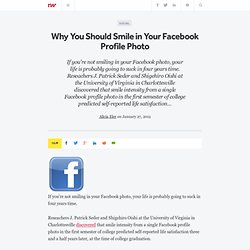
Reseachers J. Patrick Seder and Shigehiro Oishi at the University of Virginia in Charlottesville discovered that smile intensity from a single Facebook profile photo in the first semester of college predicted self-reported life satisfaction three and a half years later, at the time of college graduation. INFOGRAPHIC: Generation Y, Employment And Facebook. Young people are using Facebook for personal over professional reasons, yet they are friending their coworkers.
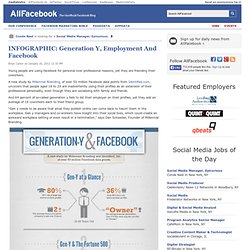
A new study by Millennial Branding, of over 50 million Facebook data points from Identified.com, uncovers that people aged 18 to 29 are inadvertently using their profiles as an extension of their professional personality, even though they are socializing with family and friends. And 64 percent of so-called generation y fails to list their employer on their profiles, yet they add an average of 16 coworkers each to their friend group. “Gen y needs to be aware that what they publish online can come back to haunt them in the workplace. Gen y managers and co-workers have insight into their social lives, which could create an awkward workplace setting or even result in a termination,” says Dan Schawbel, Founder of Millennial Branding. Identified.com is the largest professional database on Facebook.
Study: Your Facebook Personality Is The Real You. If you think you're different on Facebook than you are in real life, you've got some explaining to do.
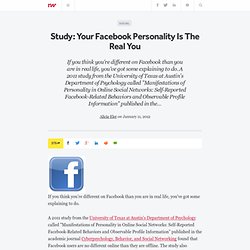
A 2011 study from the University of Texas at Austin's Department of Psychology called "Manifestations of Personality in Online Social Networks: Self-Reported Facebook-Related Behaviors and Observable Profile Information" published in the academic journal Cyberpsychology, Behavior, and Social Networking found that Facebook users are no different online than they are offline. The study also revealed strong connections between real personality and Facebook-related behavior. Social and personality processes, the study says, accurately mirror non-virtual environments. Looking at the big five personality traits - openness, conscientiousness, extraversion, agreeableness and neuroticism - Professor Samuel D. How To Win Friends on Facebook with Music and Movies. Want more Facebook friends?
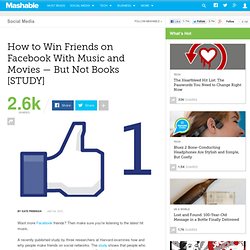
Then make sure you're listening to the latest hit music. A recently published study by three researchers at Harvard examines how and why people make friends on social networks. The study shows that people who share an interest in music and movies are most likely to friend each other. Having a similar interest in books, meanwhile, carries no weight when it comes to making online friends. Does Facebook Know Your Love Secrets? [INFOGRAPHIC] Like to keep your love life under wraps? Be careful if you're on Facebook. The social network may be able to predict how happy you are in your relationships, how satisfied your boyfriend or girlfriend is, when you're most likely to break up or make things official with someone new and even what songs you're most likely to listen to when you're on a hormone high or down in the dumps.
"It's not official until it's on Facebook," goes the not-so-old maxim. If that saying holds true though, people are most ready to start going steady around Valentine's Day and Christmas, with the beginning of April not far behind. On Feb. 14, new relationships outpace fresh breakups by 49%, according to data from the social network.
Warm weather and sunshine, meanwhile, seem to get people feeling restless — early spring and the summertime are two of the peak breakup seasons, according to people's relationship status updates.